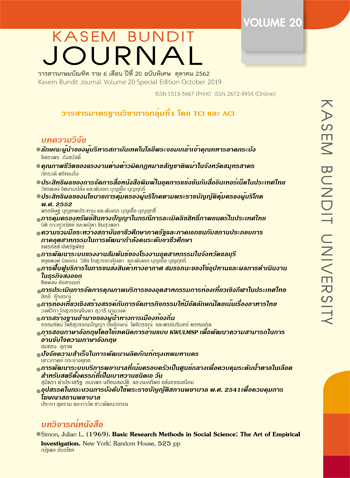Keys to Success for the Development of Bangkok Brand
Keywords:
Keys to success, development of the Bangkok Brand Project, potentials of entrepreneursAbstract
The objectives of this research were to study the current state of success of the Bangkok Brand Project, potentials of entrepreneurs, production mechanisms, administration and management, and government support; the influences of potentials of entrepreneurs, production mechanisms, administration and management, and government support on the success of the Bangkok Brand Project; and guidelines for the development of the Bangkok Brand Project with an aim to achieve continuous growth and success. This research employed a mixed research methodology. In the quantitative research component, data were collected from the sample of 340 entrepreneurs in the Bangkok Brand Project by a questionnaire and analyzed with a structural equation modeling technique. For the qualitative research part, in-depth interviews were conducted with 15 key informants. The research findings showed that the success of the Bangkok Brand, production mechanisms, administration and management, and government support were rated at a high level whereas potentials of entrepreneurs were rated at the highest level. Government support had the highest influence on the overall success of the Bangkok Brand, followed by potentials of entrepreneurs, administration and management, and production mechanisms, respectively. For developing the Bangkok Band, the government sector should train and encourage the entrepreneurs to be creative, able to plan their products to meet market demands, have knowledge of e-marketing, use modern technology, and manage their business with the private sector.
References
Aree Naipinit and colleagues. (2014). Adaptation under Globalization. Academic Journal of Songkhla Rajabhat University, 7(1), 9-10.
Community Development Department, Ministry of Interior. (2016). Report on Information of OTOP Producers, Entrepreneurs in 2014. Searched on October 17, 2016, from
https://113.53.241.24/Cddreport/central/rpProducers.aspx.
Hender, D. (1993). Managing Local Government Services. Hertfordshire: ICSA.
Kaplan, R. S. & Norton, D. P. (2004). Strategy maps: Converting intangible assets into tangible outcomes. Cambridge, MA: Harvard Business School.
Kline, R. B. (2005). Principle and practice of structural equation modeling. New york: Guilford.
Porter, M. E. (1985). Competitive strategy. Techniques for analyzing industries and comoetitors;: New York: Free Press.
Supaporn Makchaeng and Pornsiri Kongnual. (2007), Research and Networking Management Development of Community Enterprises for Systematic and Sustainable Building Local Capacity : The Study of Local Products in Pak Khlong Bang Pla Kot Community, Phra Samut Chedi District, Samut Prakarn Province. Journal of Dhonburi Rajabhat University, 1(2) Page 67.
Kline, R. B. (2005). Principle and practice of structural equation modeling. New york: Guilford.
West, S.J. (1995). Product Development in Small Business. In M.D.Earle and A.M.Anderson (eds.).
W. Chan Kim and Renee Mauborgne. (2006).Blue Ocean Strategy. Bangkok : Se-Edu cation.
Strategy and Evaluation Department, Bangkok Metropolitan Administration. (2012). Bangkok Development Plan 20 Years (2013-2032). Bangkok: Author.
Downloads
Published
How to Cite
Issue
Section
License
ทัศนคติ ความคิดเห็นใด ๆ ที่ปรากฏในวารสารเกษมบัณฑิตฉบับนี้เป็นของผู้เขียน โดยเฉพาะ มหาวิทยาลัยเกษมบัณฑิตและบรรณาธิการ ไม่จำเป็นต้องมีความเห็นพ้องด้วย







